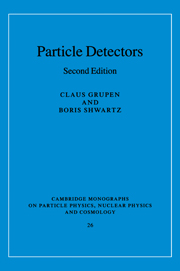Book contents
- Frontmatter
- Contents
- Preface to the second edition
- Preface to the first edition
- Introduction
- 1 Interactions of particles and radiation with matter
- 2 Characteristic properties of detectors
- 3 Units of radiation measurements and radiation sources
- 4 Accelerators
- 5 Main physical phenomena used for particle detection and basic counter types
- 6 Historical track detectors
- 7 Track detectors
- 8 Calorimetry
- 9 Particle identification
- 10 Neutrino detectors
- 11 Momentum measurement and muon detection
- 12 Ageing and radiation effects
- 13 Example of a general-purpose detector: Belle
- 14 Electronics
- 15 Data analysis
- 16 Applications of particle detectors outside particle physics
- Résumé
- 17 Glossary
- 18 Solutions
- Appendix 1 Table of fundamental physical constants
- Appendix 2 Definition and conversion of physical units
- Appendix 3 Properties of pure and composite materials
- Appendix 4 Monte Carlo event generators
- Appendix 5 Decay-level schemes
- Index
Introduction
Published online by Cambridge University Press: 19 October 2009
- Frontmatter
- Contents
- Preface to the second edition
- Preface to the first edition
- Introduction
- 1 Interactions of particles and radiation with matter
- 2 Characteristic properties of detectors
- 3 Units of radiation measurements and radiation sources
- 4 Accelerators
- 5 Main physical phenomena used for particle detection and basic counter types
- 6 Historical track detectors
- 7 Track detectors
- 8 Calorimetry
- 9 Particle identification
- 10 Neutrino detectors
- 11 Momentum measurement and muon detection
- 12 Ageing and radiation effects
- 13 Example of a general-purpose detector: Belle
- 14 Electronics
- 15 Data analysis
- 16 Applications of particle detectors outside particle physics
- Résumé
- 17 Glossary
- 18 Solutions
- Appendix 1 Table of fundamental physical constants
- Appendix 2 Definition and conversion of physical units
- Appendix 3 Properties of pure and composite materials
- Appendix 4 Monte Carlo event generators
- Appendix 5 Decay-level schemes
- Index
Summary
Every act of seeing leads to consideration, consideration to reflection, reflection to combination, and thus it may be said that in every attentive look on nature we already theorise.
Johann Wolfgang von GoetheThe development of particle detectors practically starts with the discovery of radioactivity by Henri Becquerel in the year 1896. He noticed that the radiation emanating from uranium salts could blacken photosensitive paper. Almost at the same time X rays, which originated from materials after the bombardment by energetic electrons, were discovered by Wilhelm Conrad Röntgen.
The first nuclear particle detectors (X-ray films) were thus extremely simple. Also the zinc-sulfide scintillators in use at the beginning of the last century were very primitive. Studies of scattering processes – e.g. of α particles – required tedious and tiresome optical registration of scintillation light with the human eye. In this context, it is interesting to note that Sir William Crookes experimenting in 1903 in total darkness with a very expensive radioactive material, radium bromide, first saw flashes of light emitted from the radium salt. He had accidentally spilled a small quantity of this expensive material on a thin layer of activated zinc sulfide (ZnS). To make sure he had recovered every single speck of it, he used a magnifying glass when he noticed emissions of light occurring around each tiny grain of the radioactive material.
- Type
- Chapter
- Information
- Particle Detectors , pp. xx - xxivPublisher: Cambridge University PressPrint publication year: 2008

